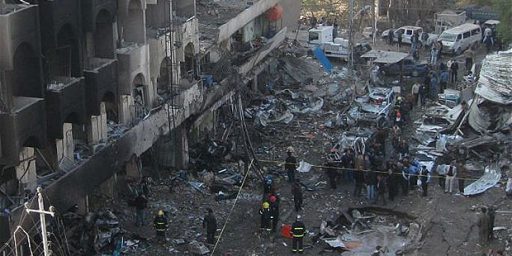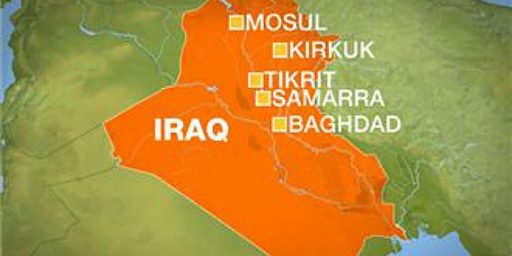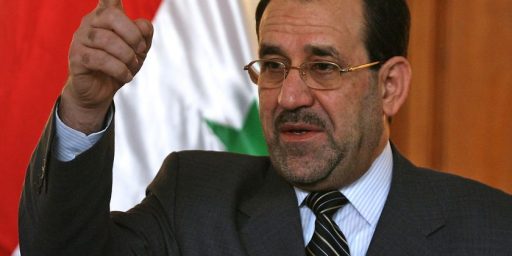New Iraqi Parliament Meets after PM Deadlock Broken
All signs now point to the formation of an Iraqi government now that the political deadlock over the premiership has been broken. The new Iraqi parliament is meeting today to formalize the new cabinet and the major factions appear ready to rally behind it, at least for the time being.
Jawad al-Malik has some impressive credentials and a background that would seem to inspire confidence. He’s a Shiite who was educated in Iraqi Kurdistan, a vocal opponent of both Saddam Hussein and the American invasion, and apparently has only loose ties to the Iranian mullahs. He does have some baggage, notably his strong leadership in the de-Baathification program.
AP’s Qassim Abdul-Zahra reports,
Al-Maliki has a reputation as a hardline, outspoken defender of the Shiite stance — raising questions over whether he will be able to negotiate the delicate sectarian balancing act. From exile in Syria in the 1980s and 1990s, he directed Dawa guerrillas fighting Saddam Hussein’s regime. Since returning home after Saddam’s fall, he has been a prominent member of the commission purging former Baath Party officials from the military and government. Sunni Arabs, who made up the backbone of Saddam’s ousted party, deeply resent the commission. Al-Maliki was also a tough negotiator in drawn-out deliberations over a new constitution that was passed last year despite Sunni Arab objections. He resisted U.S. efforts to put more Sunnis on the drafting committee as well as Sunni efforts to water down provisions giving Shiites and Kurds the power to form semiautonomous mini-states in the north and south.
Nelson Hernandez and K.I. Ibrahim, writing for WaPo, add:
Maliki was “chosen for his acceptability both by groups inside the alliance and outside it,” Ridha Jawad Taqi, a spokesman for the Supreme Council, said at a news conference broadcast on Iraqi television. “We want to have a government of national unity and partnership, a government that includes all components of Iraqi society, one that will be accepted by any ethnicity or group.”
The U.S. ambassador to Iraq, Zalmay Khalilzad, said the choice of Maliki was “a good step in the right direction. He’s an Iraqi patriot. He’s a strong leader.”
Yet Maliki, born in 1950 near the Shiite holy city of Karbala, possesses credentials that may not endear him to Sunni Arabs or U.S. officials wary of foreign influence. He joined the Shiite-dominated Dawa party in 1968, soon falling foul of Iraq’s Baath Party government. He fled Iraq in 1980, a year after Hussein rose to the presidency, and spent his years in exile in Iran and Syria. He was sentenced to death in absentia, returning to Iraq only after the U.S.-led invasion that toppled Hussein in 2003.
Although he was a strident opponent of Hussein, he also opposed the invasion that ultimately forced the ruler from power. “The danger to Iraq lies in the possibility of the U.S. administration making mistakes in its supervision of this crisis,” he said in an interview with the Lebanese newspaper al-Nahar in December 2002 that was translated by the U.S. government’s Open Source Center. “Those who will rule Iraq after Saddam Hussein cannot be envied. Don’t fight for ruling an Iraq full of widows and orphans and burdened with heavy debt.”
But one would think this background would give him excellent “street cred” among Iraqis. Having stood up to Hussein and been opposed to a now-unpopular U.S. invasion from the beginning would seem to align him perfectly with the vast majority of the Iraqi people. That removing Saddam was only accomplished by virtue of said invasion is both true and irrelevant politically.
Further, there seems to be a strong consensus that Maliki represents the best hope for a peaceful, democratic Iraq.
The need to avoid another drawn-out battle over the prime minister’s job, and the hope that a new government could help stabilize the country, appeared to be significant factors in the decision by Kurdish and Sunni Arab leaders to support Mr. Maliki. “We don’t have many options, and we would like to push the political process forward,” said Tariq al-Hashemi, leader of the Iraqi Consensus Front, the largest Sunni Arab group, on Friday. “We will cooperate with him and we will support him tomorrow.” In an interview Friday night, Mahmoud Othman, a senior member of the Kurdish political alliance, said of Mr. Maliki, “We have no objection to him and we wish him success.” He also said the Kurds would support Mr. Mashhadani. The day before, Mr. Othman had described Mr. Mashhadani as an “extremist” not suitable to become speaker. Bickering political factions could conceivably raise objections to any nominee, Mr. Othman explained, but he said that now there was “no time” for that because of Iraq’s current condition. “This needs to move forward, so we had no objection,” he said.
There’s still a lot to be done, not least of which is finding a way to make the streets safe from suicide bombers. But the formation of a stable government is a necessary precursor to doing any of that and it looks to be happening. Finally.





